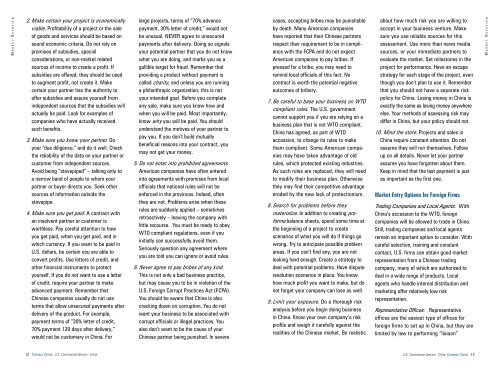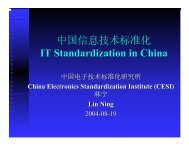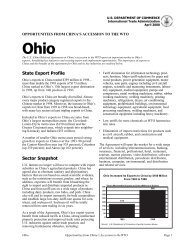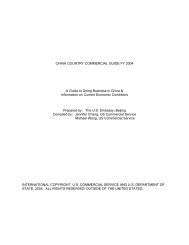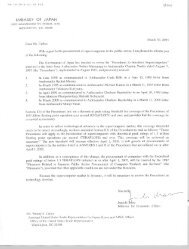U.S. Commercial Service Offices in China - Market Access and ...
U.S. Commercial Service Offices in China - Market Access and ...
U.S. Commercial Service Offices in China - Market Access and ...
Create successful ePaper yourself
Turn your PDF publications into a flip-book with our unique Google optimized e-Paper software.
M ARKET O VERVIEW<br />
2. Make certa<strong>in</strong> your project is economically<br />
viable. Profitability of a project or the sale<br />
of goods <strong>and</strong> services should be based on<br />
sound economic criteria. Do not rely on<br />
promises of subsidies, special<br />
considerations, or non-market related<br />
sources of <strong>in</strong>come to create a profit. If<br />
subsidies are offered, they should be used<br />
to augment profit, not create it. Make<br />
certa<strong>in</strong> your partner has the authority to<br />
offer subsidies <strong>and</strong> assure yourself from<br />
<strong>in</strong>dependent sources that the subsidies will<br />
actually be paid. Look for examples of<br />
companies who have actually received<br />
such benefits.<br />
3. Make sure you know your partner. Do<br />
your “due diligence,” <strong>and</strong> do it well. Check<br />
the reliability of the data on your partner or<br />
customer from <strong>in</strong>dependent sources.<br />
Avoid be<strong>in</strong>g “stovepiped” – talk<strong>in</strong>g only to<br />
a narrow b<strong>and</strong> of people to whom your<br />
partner or buyer directs you. Seek other<br />
sources of <strong>in</strong>formation outside the<br />
stovepipe.<br />
4. Make sure you get paid. A contract with<br />
an <strong>in</strong>solvent partner or customer is<br />
worthless. Pay careful attention to how<br />
you get paid, when you get paid, <strong>and</strong> <strong>in</strong><br />
which currency. If you want to be paid <strong>in</strong><br />
U.S. dollars, be certa<strong>in</strong> you are able to<br />
convert profits. Use letters of credit, <strong>and</strong><br />
other f<strong>in</strong>ancial <strong>in</strong>struments to protect<br />
yourself. If you do not want to use a letter<br />
of credit, require your partner to make<br />
advanced payment. Remember that<br />
Ch<strong>in</strong>ese companies usually do not use<br />
terms that allow unsecured payments after<br />
delivery of the product. For example,<br />
payment terms of “30% letter of credit,<br />
70% payment 120 days after delivery,”<br />
would not be customary <strong>in</strong> Ch<strong>in</strong>a. For<br />
large projects, terms of “70% advance<br />
payment, 30% letter of credit,” would not<br />
be unusual. NEVER agree to unsecured<br />
payments after delivery. Do<strong>in</strong>g so signals<br />
your potential partner that you do not know<br />
what you are do<strong>in</strong>g, <strong>and</strong> marks you as a<br />
gullible target for fraud. Remember that<br />
provid<strong>in</strong>g a product without payment is<br />
called charity, <strong>and</strong> unless you are runn<strong>in</strong>g<br />
a philanthropic organization, this is not<br />
your <strong>in</strong>tended goal. Before you complete<br />
any sale, make sure you know how <strong>and</strong><br />
when you will be paid. Most importantly,<br />
know why you will be paid. You should<br />
underst<strong>and</strong> the motives of your partner to<br />
pay you. If you don’t build mutually<br />
beneficial reasons <strong>in</strong>to your contract, you<br />
may not get your money.<br />
5. Do not enter <strong>in</strong>to prohibited agreements.<br />
American companies have often entered<br />
<strong>in</strong>to agreements with promises from local<br />
officials that national rules will not be<br />
enforced <strong>in</strong> the prov<strong>in</strong>ces. Indeed, often<br />
they are not. Problems arise when these<br />
rules are suddenly applied – sometimes<br />
retroactively – leav<strong>in</strong>g the company with<br />
little recourse. You must be ready to obey<br />
WTO compliant regulations, even if you<br />
<strong>in</strong>itially can successfully avoid them.<br />
Seriously question any agreement where<br />
you are told you can ignore or avoid rules.<br />
6. Never agree to pay bribes of any k<strong>in</strong>d.<br />
This is not only a bad bus<strong>in</strong>ess practice,<br />
but may cause you to be <strong>in</strong> violation of the<br />
U.S. Foreign Corrupt Practices Act (FCPA).<br />
You should be aware that Ch<strong>in</strong>a is also<br />
crack<strong>in</strong>g down on corruption. You do not<br />
want your bus<strong>in</strong>ess to be associated with<br />
corrupt officials or illegal practices. You<br />
also don’t want to be the cause of your<br />
Ch<strong>in</strong>ese partner be<strong>in</strong>g punished. In severe<br />
cases, accept<strong>in</strong>g bribes may be punishable<br />
by death. Many American companies<br />
have reported that their Ch<strong>in</strong>ese partners<br />
respect their requirement to be <strong>in</strong> compliance<br />
with the FCPA <strong>and</strong> do not expect<br />
American companies to pay bribes. If<br />
pressed for a bribe, you may need to<br />
rem<strong>in</strong>d local officials of this fact. No<br />
contract is worth the potential negative<br />
outcomes of bribery.<br />
7. Be careful to base your bus<strong>in</strong>ess on WTO<br />
compliant rules. The U.S. government<br />
cannot support you if you are rely<strong>in</strong>g on a<br />
bus<strong>in</strong>ess plan that is not WTO compliant.<br />
Ch<strong>in</strong>a has agreed, as part of WTO<br />
accession, to change its rules to make<br />
them compliant. Some American companies<br />
may have taken advantage of old<br />
rules, which protected exist<strong>in</strong>g <strong>in</strong>dustries.<br />
As such rules are replaced, they will need<br />
to modify their bus<strong>in</strong>ess plan. Otherwise<br />
they may f<strong>in</strong>d their competitive advantage<br />
eroded by the new lack of protectionism.<br />
8. Search for problems before they<br />
materialize. In addition to creat<strong>in</strong>g proforma<br />
balance sheets, spend some time at<br />
the beg<strong>in</strong>n<strong>in</strong>g of a project to create<br />
scenarios of what you will do if th<strong>in</strong>gs go<br />
wrong. Try to anticipate possible problem<br />
areas. If you can’t f<strong>in</strong>d any, you are not<br />
look<strong>in</strong>g hard enough. Create a strategy to<br />
deal with potential problems. Have dispute<br />
resolution scenarios <strong>in</strong> place. You know<br />
how much profit you want to make, but do<br />
not forget your company can lose as well.<br />
9. Limit your exposure. Do a thorough risk<br />
analysis before you beg<strong>in</strong> do<strong>in</strong>g bus<strong>in</strong>ess<br />
<strong>in</strong> Ch<strong>in</strong>a. Know your own company’s risk<br />
profile <strong>and</strong> weigh it carefully aga<strong>in</strong>st the<br />
realities of the Ch<strong>in</strong>ese market. Be realistic<br />
about how much risk you are will<strong>in</strong>g to<br />
accept <strong>in</strong> your bus<strong>in</strong>ess venture. Make<br />
sure you use reliable sources for this<br />
assessment. Use more than news media<br />
sources, or your immediate partners to<br />
evaluate the market. Set milestones <strong>in</strong> the<br />
project for performance. Have an escape<br />
strategy for each stage of the project, even<br />
though you don’t plan to use it. Remember<br />
that you should not have a separate risk<br />
policy for Ch<strong>in</strong>a. Los<strong>in</strong>g money <strong>in</strong> Ch<strong>in</strong>a is<br />
exactly the same as los<strong>in</strong>g money anywhere<br />
else. Your methods of assess<strong>in</strong>g risk may<br />
differ <strong>in</strong> Ch<strong>in</strong>a, but your policy should not.<br />
10. M<strong>in</strong>d the store. Projects <strong>and</strong> sales <strong>in</strong><br />
Ch<strong>in</strong>a require constant attention. Do not<br />
assume they will run themselves. Follow<br />
up on all details. Never let your partner<br />
assume you have forgotten about them.<br />
Keep <strong>in</strong> m<strong>in</strong>d that the last payment is just<br />
as important as the first one.<br />
<strong>Market</strong> Entry Options for Foreign Firms<br />
Trad<strong>in</strong>g Companies <strong>and</strong> Local Agents: With<br />
Ch<strong>in</strong>a’s accession to the WTO, foreign<br />
companies will be allowed to trade <strong>in</strong> Ch<strong>in</strong>a.<br />
Still, trad<strong>in</strong>g companies <strong>and</strong> local agents<br />
rema<strong>in</strong> an important option to consider. With<br />
careful selection, tra<strong>in</strong><strong>in</strong>g <strong>and</strong> constant<br />
contact, U.S. firms can obta<strong>in</strong> good market<br />
representation from a Ch<strong>in</strong>ese trad<strong>in</strong>g<br />
company, many of which are authorized to<br />
deal <strong>in</strong> a wide range of products. Local<br />
agents who h<strong>and</strong>le <strong>in</strong>ternal distribution <strong>and</strong><br />
market<strong>in</strong>g offer relatively low risk<br />
representation.<br />
Representative <strong>Offices</strong>: Representative<br />
offices are the easiest type of offices for<br />
foreign firms to set up <strong>in</strong> Ch<strong>in</strong>a, but they are<br />
limited by law to perform<strong>in</strong>g “liaison”<br />
M ARKET O VERVIEW<br />
12 Contact Ch<strong>in</strong>a U.S. <strong>Commercial</strong> <strong>Service</strong> - Ch<strong>in</strong>a<br />
U.S. <strong>Commercial</strong> <strong>Service</strong> - Ch<strong>in</strong>a Contact Ch<strong>in</strong>a 13


